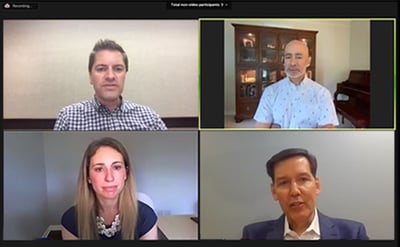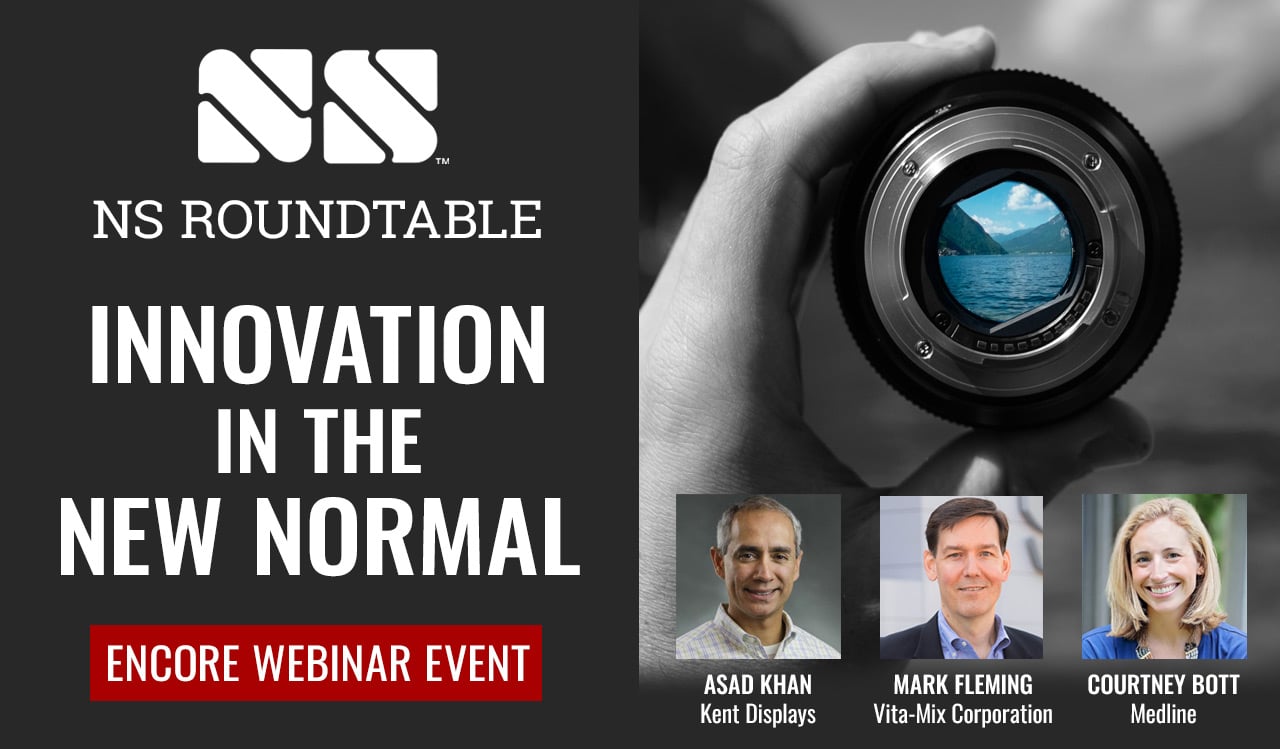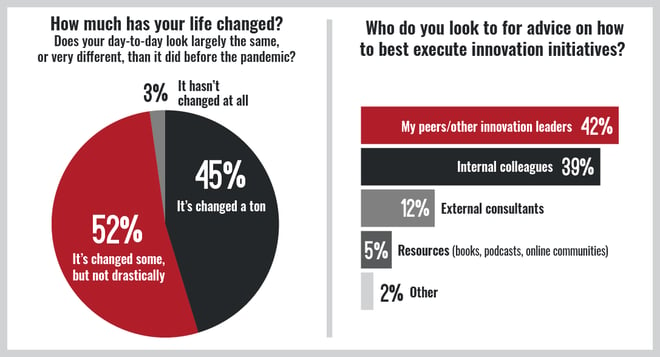Business leaders talk to NS about how they’re navigating unprecedented disruption
Nottingham Spirk
 For the second installment of Nottingham Spirk’s NS Roundtable webinar, titled “Innovation in the New Normal,” Bill Nottingham led a discussion on the unprecedented challenges posed by the ongoing pandemic. Joining him were:
For the second installment of Nottingham Spirk’s NS Roundtable webinar, titled “Innovation in the New Normal,” Bill Nottingham led a discussion on the unprecedented challenges posed by the ongoing pandemic. Joining him were:
- Courtney Bott, Director of Innovation, Medline Industries
- Mark Fleming, Senior Vice President, Vitamix
- Asad Khan, CEO, Kent Displays
The entire conversation is available on YouTube. Here are some highlights.
Adapting to remote work takes practice
“We are all learning new ways to interact with each other,” said Khan, referring to himself and his colleagues, some of whom he’s worked with for more than 20 years. “We all know each other’s body language even, but now we’re having to change. … We are a very organic culture, and after a couple of months we’re really missing that piece. Zoom only goes so far.”
“The events that are occurring throughout my day are completely different from the events occurring throughout the day of those I work with,” added Flemimg, “and therefore the common purpose is very hard to maintain. And we as leaders need to be cognizant of that because as stay-at-home becomes more common, that culture will deteriorate and your ability to affect change and cause alignment will deteriorate. … I find myself communicating way more than I would with my teams, not that I don’t trust them, it’s that we need to be aligned more.”
“Medline is culturally very entrepreneurial,” explained Bott, “and I believe that will stay the same. I believe what will change is the appetite for being intentional around growth opportunities, around opportunities for innovation, and maybe putting a little more structure around how we do that.”
Some opportunities are already becoming clear
“I want there to be devices around telemedicine, anything I can use at home to stay out of the pediatrician’s office,” said Bott, who called herself a “convert” after recent telemedicine appointments for her kids.
“My guess is that out of this people are going to be craving experience because of the fact they have been contactless, they’re not having the interactions they used to have,” said Fleming. “If you look at the service through which you provide your product, the channel, the brand, how you engage the customer, all of those provide unique opportunities for innovation.”
“Our products are very touch-based,” said Khan, “so we’ve always considered that it’s important for the customer to touch the product before that purchase decision, and that doesn’t lend itself to online. So we’ve had to figure out new ways to communicate our value propositions to consumers who won’t be able to touch the product. … Adaptation is the key.”
Above: Poll results from the webinar attendees; 265 innovation executives attended the webinar, and 75% participated in the polls.
Is “co-opetition” (collaborating with unlikely partners) the way forward?
“There almost aren’t any walls now, because we’re all outside of our own walls,” said Nottingham.
“I’m a big proponent of this,” said Bott. “To innovate you really have to let go of your ego sometimes. … Yes, it’s competitive and we want to have that competitive spirit and do it all, but when you partner with someone else and when you collaborate, you can achieve better results faster when the partnership is right. Look outside before assuming you have all the answers.”
“We’re just starting some collaboration with a local company we’ve known for a long time,” said Khan. “Our collaboration is not necessarily based on the pandemic or economic conditions, it’s simply come about because we’re being forced to think differently. It’s this notion of taking action now. And that’s a really interesting and awesome side effect.”
“We’ve been doing that for at least the last 10 years,” added Fleming. “One of the keys to it is to ensure you have a good contract in place because it does get rough at times.”
What advice can you offer for moving forward?
“If I had unlimited resources,” said Bott, “I think I would push to innovate how we work, and freeing up the time to spend observing users and spotting those problems. Often where we get stuck is not having that clarity on the problem we’re solving.”
“I think there needs to be more innovation around information throttling,” said Khan. “There’s a lot of noise, and I think we need a lot of innovation around throttling that so that we can get quality information that’s verifiable and not trivial.”
“There are great articles out there on building resilience in your children, and I would encourage those listening to read those articles,” advised Fleming. “I find that they are actually awesome for establishing business practices. A resilient is one that does go ask for help and can pick itself up and dust itself off. … Building up your team’s resilience, building up your own resilience, is the key.”
About Nottingham Spirk
Nottingham Spirk is an established leader in disruptive innovation, partnering with companies to create thriving new business innovations that propel economic growth. Since 1972, the privately owned company has served as a beacon of innovation for organizations pursuing uncharted territory to accelerate growth and improve life experiences. Learn more about our innovation approach.


Submit a comment